SCCRR`s Peacebuilding strategy is designed to prevent the recurrence of violence by creating an environment of resilience, sustainable peace and development -with optimal aim of transforming the underlying potential for violence. In the month of February, SCCRR’s approach to conflict intervention will be primarily focusing on 3 aspects;
1) Building authentic relationships of trust and collaboration
2) Empirical Research and Conflict analysis
3) Operationalizing joint Development initiatives
Shalom’s analysis of the prevailing conflict situations in various project areas often identify that one of the key enablers of the recurrence of interethnic conflict where we work with is the deep seated mistrust resulting from conflict memory. “Conflict has memory that is not only resilient and moored in culture, but frequently contaminated by malign intentions and distorted ‘historical’ narratives”, (Rev. Patrick Devine, PhD). Mistrust is therefore a factor that is at the epicenter of the multi-dimensional underlying causes of conflicts in Eastern Africa. Because of this, SCCRR never underestimates its commitment to exploring the optimum methodologies necessary for inter-community trust building and reconciliation interventions. This involves providing spaces in the conflict environments for inter-ethnic community conversations, negotiations, and conducting joint peace and development initiatives.
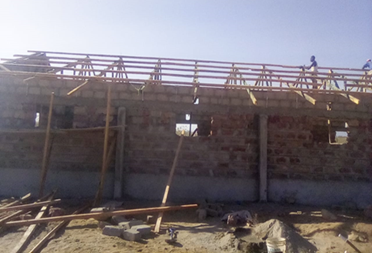
Ongoing construction at Kakong’u Primary School in Kainuk, Turkana County
In our interventions, Shalom pays very close attention to emerging conflict issues as a backdrop to redesigning our sustainable peacebuilding-development project activities. Monitoring and updating our conflict analysis interventions and reports are critical to this process. In order to respond to these key focus areas, Shalom will engage in conducting detailed data collection which will subsequently provide information that will be subjected to technical and academically rigorous analysis through the well-established research department under the leadership of Prof. Omoka, supported by the analytical input of Rev. Patrick Devine, PhD and the entire skilled expertise within Shalom. This conflict analysis will help in finding out the changing dynamics in the underlying causes of conflict in selected areas of our work. It is important to mention that the key focus area in the month of February for this year will be close to the border of South Ethiopia among the Merille and the Nyang’atom communities who experience frequent flare ups of overt conflict with the neighboring Turkana people from Kenya. Additionally, the interventions will support the continuation of long-term engagements with the ethnic communities aimed at furthering the improvement of more cohesive inter and intra-community relationships.
In our development projects, we are happy to report a 90% completion of projects SCCRR initiated at the end 2018 in ten (10) inter-ethnic and inter-religious schools in Samburu, Marsabit and Turkana Counties. So far, three quality classrooms in Marsabit are complete and pupils have started using them for their lessons. This is a great achievement for them because they will no longer attend classes in shifts or under trees as a result of the lack of enough facilities. In February, our focus will be on the completion of two construction projects which are on course in Kainuk along the volatile border area between Turkana and West-Pokot counties.
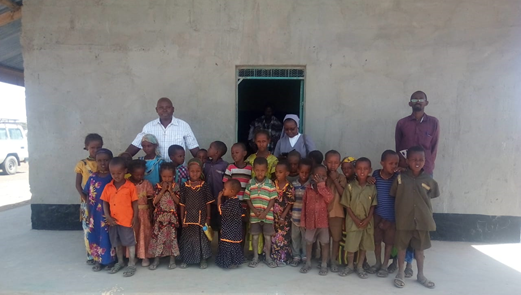
Pupils of El Buru Magado Nursery School, Marsabit County, outside their newly Shalom constructed classroom
Furthermore, Shalom’s development work is undergoing an expansion in order to reach out to more schools within the conflict environments that are in need of various forms of support having suffered from various effects of conflict. In February, Shalom will be conducting detailed needs assessment on inter-ethnic and inter-religious schools that have been newly identified in the various project locations. These are schools which have undergone destruction during times of conflict and massive reduction in the number of pupils in the cause of community migrations to safer areas. Consequently, they are in dire need of reconstruction, material support and establishment of peace education programs in order to restore conducive learning environments, encourage the return of pupils, increase enrollment of new ones and foster high retention of the enrolled pupils in the affected schools. This is real life changing sustainable development.
The pupils and students from these conflict environments through Shalom’s development projects and the local communities’ contributions will continue benefitting from the provision of teaching and learning materials, building and renovation of classrooms, supply of facilities such as solar lighting systems, teaching and learning materials such as text books, desks, tables and chairs and medical supplies, water projects and sanitary facilities for both boys and girls.
A detailed presentation of our February 2019 activities are in the table below:
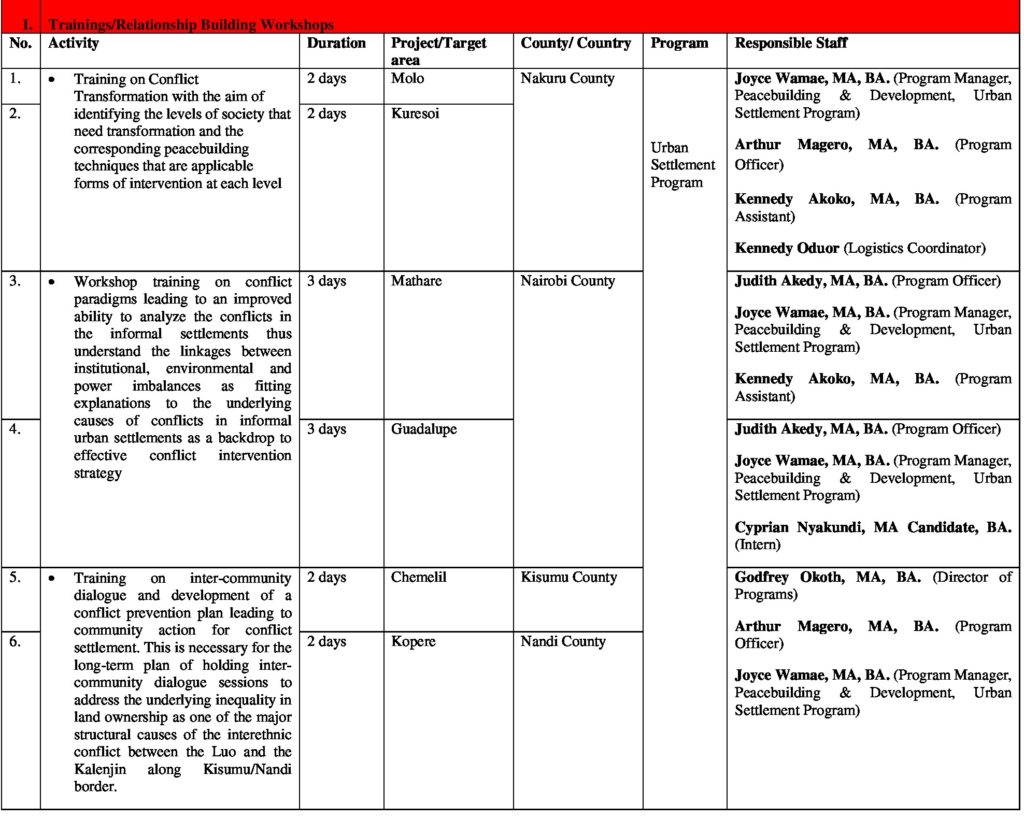
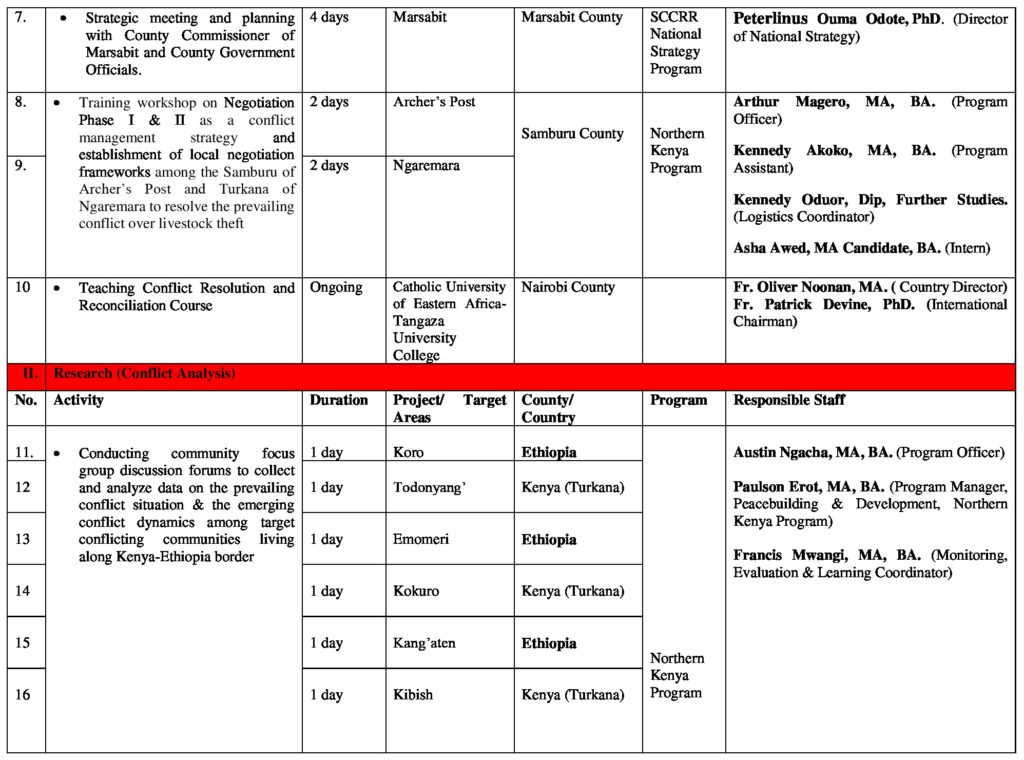
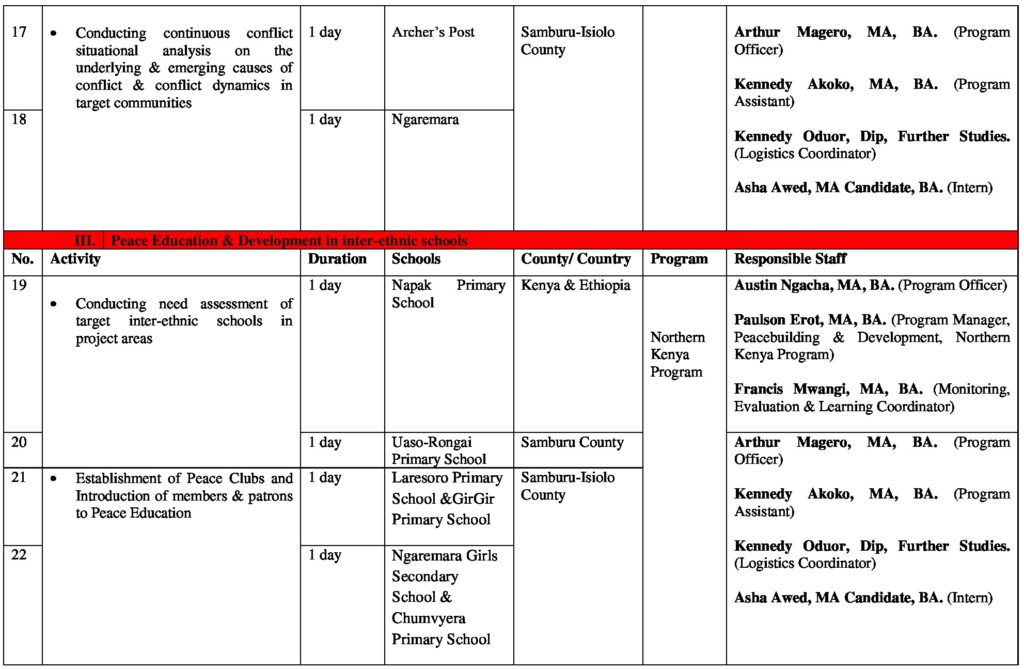
Our gratitude goes to the skillful expertise of Shalom team for their unwavering commitment and enthusiasm in implementing SCCRR peacebuilding and development activities supplemented by the frequent management expertise, leadership and guidance from Fr. Oliver Noonan, MA, (Country Director), Fr. Patrick Devine, PhD (International Chairman) and our International Consultants.
On behalf of the Shalom Team, we would like to acknowledge all Shalom donors and partners for their steadfast commitment to ensuring that conflicting communities in Eastern Africa are empowered to facilitate their own solutions that build on fostering sustainable peace and development. This is your contribution and thousands of children families and communities are benefitting!
By SCCRR Program Management and Development Team
Joyce Wamae Kamau, MA, Program Manager (Peacebuilding & Development, Urban Settlements Program).
Austin Ngacha, MA, Program Officer, Ilemi Triangle Project & M&E, development projects.
Paulson Tadeo Erot, MA, Program Manager (Peacebuilding & Development, Northern Kenya Program).
Godfrey Okoth Onyango, MA, Director of Programs.

